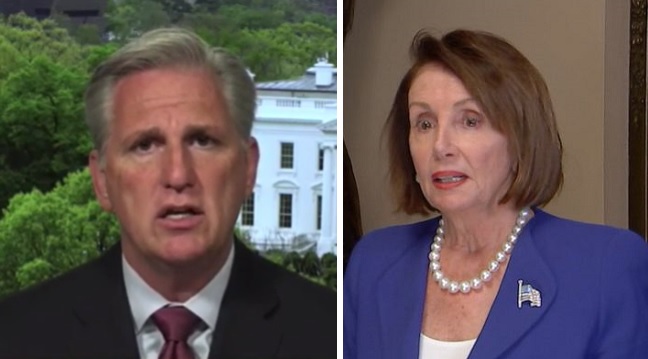House Minority Leader Kevin McCarthy admitted Congress “will look and feel different” but must reopen as he revealed details of a plan to get the House of Representatives back to work.
The California Republican and some of his colleagues from the GOP released details of the plan even as the Senate returns to work in the Capitol on Monday and House Speaker Nancy Pelosi continues to delay the return of House members.
“This pandemic has claimed too many lives and livelihoods already. We must not allow the institution we are tasked with safeguarding to be the next,” McCarthy, along with Reps. Tom Cole and Rodney Davis wrote in “A Plan for the People’s House” released Monday.
“In the interim, a bipartisan taskforce has been convened — on which we are all serving — to further explore ways in which Congress can operate during this challenging time. While differences remain, it has become clear through our initial meetings that all members of our taskforce share several fundamental beliefs,” McCarthy wrote.
Those “beliefs” were listed as a view that “the business of the People’s House is ‘essential work’ that must not be sidelined or ground to a halt,” that the “intrinsic value” of Congress meeting in person “should be dutifully guarded” and that any changes to the institutions “should be done in a deliberate and bipartisan way.”
Nancy Pelosi has pushed back to May 11 a return to business for the House as Democrats still fearful of the coronavirus pandemic have resisted efforts to return sooner, earning plenty of backlash and rebukes for considering themselves more valuable than healthcare workers and others who have daily put their lives on the line.
McCarthy’s plan included suggested forms of safety protocols such as plexiglass dividers as well as temperature checks and testing for COVID-19. A phased return with committees, and rotation of hearing rooms as well would help to “reduce density and congestion,” the plan noted.
“Just as our states are employing a phased reopening approach, Congress should do so as well — beginning with committees and subcommittees as the engines of regular order,” McCarthy wrote. “Each committee should present an outline to the Majority Leader detailing their projected business meetings for the month ahead, along with estimated attendance levels.”
“Before we rush to discard over 200 years of precedent, we should require that rigorous testing standards be met, ample feedback be provided, and bipartisan rules of the road be agreed upon and made public to truly safeguard minority rights,” McCarthy and the lawmakers wrote.
The plan also called for risk mitigation practices to be “accelerated.”
“We fully appreciate the extraordinary nature of the challenge before us,” they concluded.
“However, when it comes to fundamentally altering how the House operates — in this case, potentially abandoning the Capitol for the remainder of the 116th Congress under the introduced Democratic proposal — every avenue should first be explored that preserves enduring institutional rules while prioritizing member health,” they wrote. “This pandemic has claimed too many lives and livelihoods already. We must not allow the institution we are tasked with safeguarding to be the next.”











